09.12.24 - From 14-18 October, a delegation from EPFL Space Center travelled to Milan to participate in the 75th International Astronautical Congress (IAC) which had the title “Responsible Space for Sustainability”. The event was marked by major announcements, lively panel discussions and incisive presentations.
An inspirational gathering
The IAC offers everyone the latest space information and developments in academia and industry, networking opportunities, contacts, and potential partnerships. As representatives of an institution at the cutting edge of innovation, and as a Center with a pedagogical vocation committed to federating space-related entities in Switzerland and Europe, it is essential for us to take part in this major space event. It enables us to exchange ideas, make progress and collaborate on projects and subjects of vital importance, and sheds new light on our domain.
The event kicked off with a highly emotional opening ceremony, setting an inspiring tone for this record-breaking edition. Attendees were greeted by the Mimi mascots—astronaut-like characters who roamed the exhibition space, adding a playful touch to the atmosphere. Among the major highlights, Prada and Axiom Space unveiled NASA's new spacesuit design for the Artemis III lunar mission, which will mark a historic milestone as the first crewed Moon landing since 1972. The event also featured a Public Day, with the International Astronauts Chapter advocating for responsible space practices and the sustainable future of space exploration.
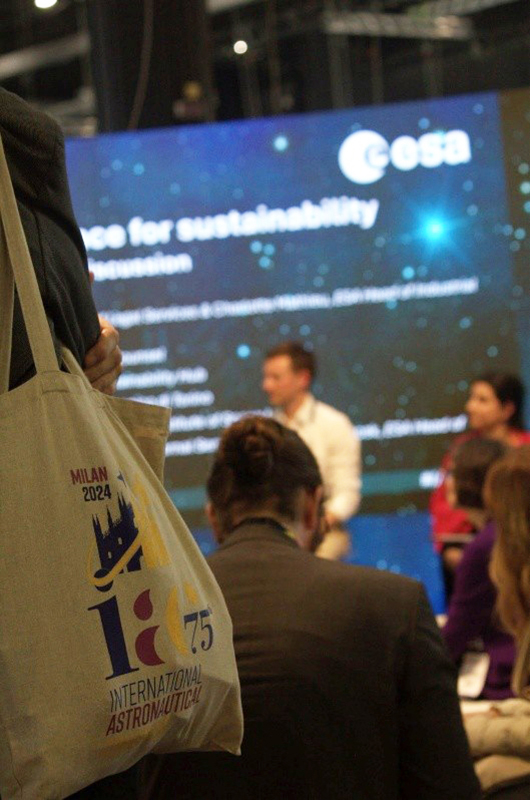
A strong Swiss presence
The Swiss Pavilion was the place to be during the IAC week, it had everything you’d need: great coffee, sweets, and chocolate, interactive presentations, Swiss space hardware on display, and a relaxing area to meet with colleagues, partners, and friends. Especially Swiss partners from other universities and from industries who were orbiting the place. The EPFL team also joined them at the Swiss diner on Tuesday night.
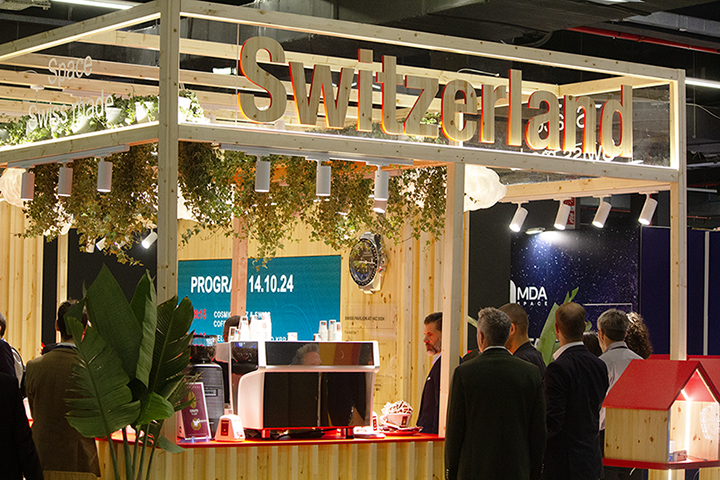
Many Swiss students and young professionals were attending the congress, some for the first time. Special mention to Space eXchange Switzerland (SXS), the organisers of the Swiss Pavilion, who, with the support of the Swiss SGAC points of contact, provided grants to 15 young people across Switzerland ! The EPFL Space Center also supported 8 students by providing them access to the event, as it is important to include them in these conferences and give them exposure.
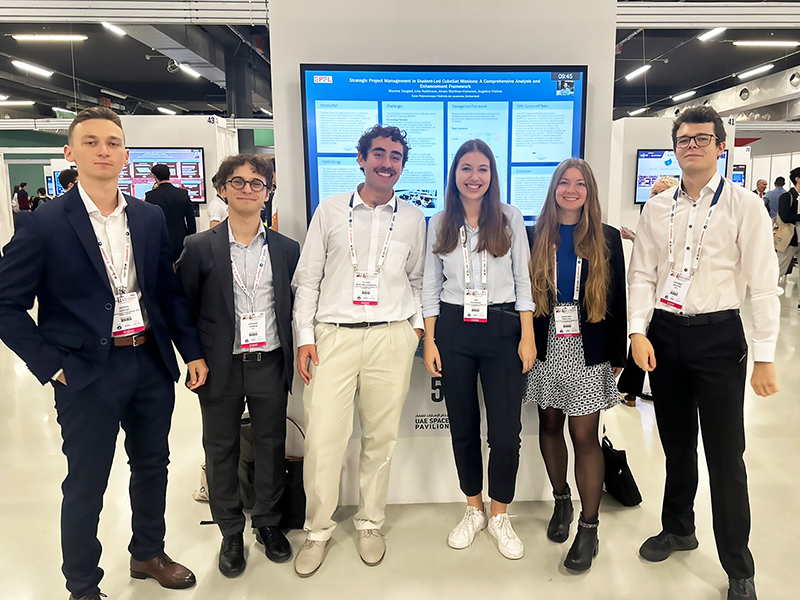
EPFL Space Center - presenting research and advocating for a comprehensive definition of “space sustainability”
ECSECO / ECSL panel on Monday
Mathieu Udriot took part in a panel on the ESA booth with three high-quality co-panellists:
- Catherine Doldirina (General Counsel D-Orbit)
- Marianna Valente (PhD Politecnico di Torino)
- Dr. Martha Mejia-Kaiser (Board Member of International Institute of Space Law)
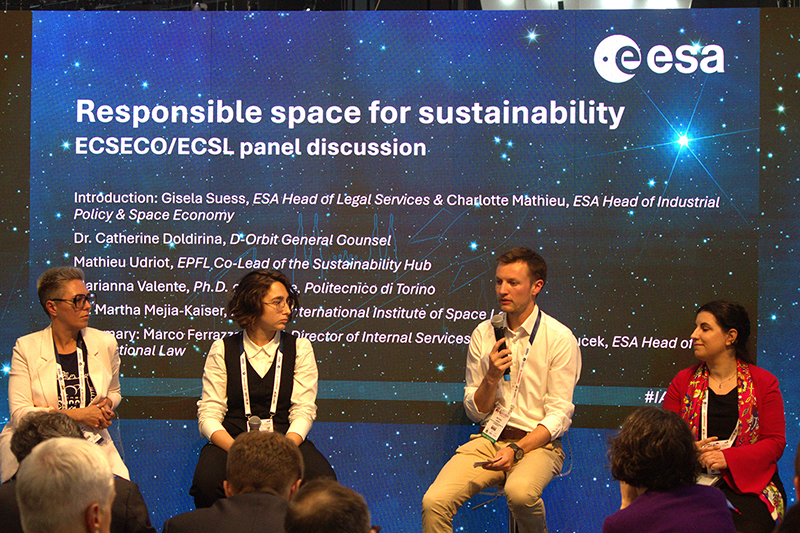
The panel was skilfully moderated by Alexander Soucek (Head of International Law Division at ESA) and touched upon the definition of space sustainability for the panellists that had different backgrounds, the drivers for space actors to act responsibly and sustainably, governance, and others. The public was able to ask questions and interact with the panel which opened the discussions toward their interests. When asked about their biggest fear, Mathieu mentioned the yet uncharacterized impacts of space systems on the high layers of the atmosphere, during launch and reentry, which could dominate their environmental footprint and increase dramatically with the number of launches and objects in space.
Signature of the Statement for a Responsible Space Sector
Emmanuelle David, executive director of the EPFL Space Center, signed the Statement for a Responsible Space Sector next to ESA Director General Josef Aschbacher and ESA Chief Climate and Sustainability Officer Andrea Vena. A large and interested public gathered at the signing ceremony as Mrs. David and other companies executives signed this landmark document paving the way to work towards the socially and environmentally responsible management of all activities within the space sector.
Taking the opportunity to say a few words, she underlined the importance for EPFL, to train the future generation of space leaders and professionals with the topic of sustainability. She also mentioned ongoing research projects on space sustainability that EPFL Space Center is leading within the Sustainable Space Hub.
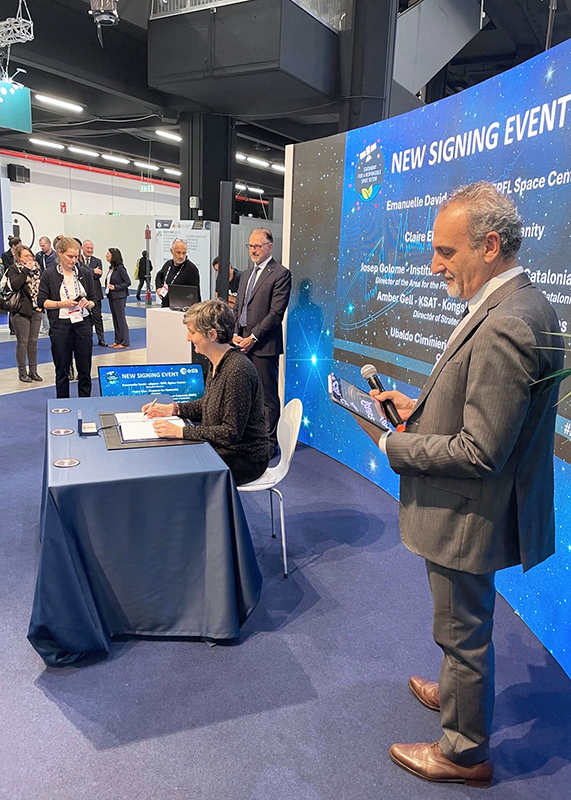
Panel discussion and workshop on Space Based Solar Power (SBSP) and its sustainability considerations
On the last day of the conference, Emmanuelle David also participated in a panel discussion on SBSP systems moderated by Dr. Haroon Okab (President of the Kepler Space university and co-founder of Metsat UK Ltd). These kilometre long and large future satellite systems, designed to collect solar energy and transmit it wirelessly to Earth were discussed in detail. Critical environmental considerations to design and operate such systems sustainably were discussed, with Emmanuelle providing a holistic view.
Besides the technical aspects of circular economy in space highlighted by her co-panellists, Emmanuelle emphasised the broad perspective on sustainability, underlining the potential need for many launches and re-entries and the adverse impacts that may have. Moreover, she emphasised the dark & quiet skies and space debris considerations.
This panel discussion was followed by a workshop, during which the participants reflected on their newfound knowledge. Emmanuelle led one team, which discussed in further detail the legislative aspects of such systems, on top of the environmental impacts to consider.
“Our session” D2.9-D6.2 addressed the Sustainable Approaches and Impact of Space Transportation Solutions on Earth and Space Environment, and on General Safety. It was co-chaired by Emmanuelle David.
After a keynote from Andrea Vena on sustainability efforts and strategies implemented at ESA, there were several presentations, including 3 related directly to EPFL:
- Marnix Verkammen, eSpace engineer - Meta-study of current proposed life cycle assessment single-score methodologies for space missions' eco-design
- Angelina Frolova - Streamlining Life Cycle Assessment Framework for Space Missions at Early Design Stages: Insights from the CHESS Cubesat Mission
- Mathieu Udriot, eSpace engineer - Sustainability of end-to-end space transportation missions: Modelling technical and environmental aspects for early phases ecodesign decision support
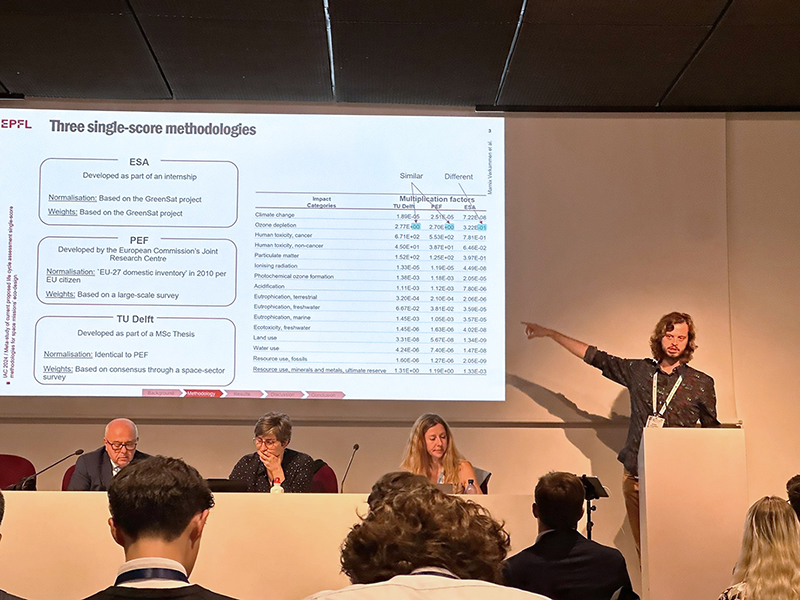
A large attendance was still present, considering it was Friday afternoon, and many interesting questions and discussions happened.
Main takeaways
- IAC 2024 was the largest space event of the year with more than 10’000 attendees (and probably the largest IAC of all time)
- Many discussions, panels, presentations addressed “sustainability” in some way, but not all stakeholders have the same definition or vision of space sustainability.
- For some it is about mission sustainability, the ability to sustain human exploration for a long time, on the Moon for instance.
- Some covered all three domains of environmental, social, and economic sustainability.
- While more and more people mentioned life cycle assessment (LCA), space sustainability is still mainly understood as the issue of space debris in orbit.
- EPFL is advocating for a comprehensive view of space sustainability that covers space debris, but also impacts on Earth with LCA and ecodesign, connecting with Sustainable Development Goals for the sustainability benefits from space.